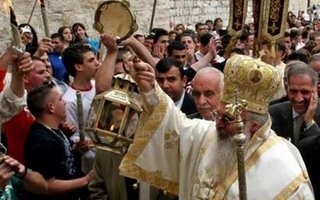Originally posted on this blog on April of 2002:
This Sunday which now is the Feast of Divine Mercy is also the Sunday where we hear the story of the so called
doubting Apostle Thomas. The lone Apostle who is not locked in the Upper Room with the other surviving Apostles. It strikes me that he always gets a bad rap, undeservedly so, I would say.
Remember on the way to Jerusalem, one of the Apostles pointed out to Our Lord that a certain death awaited Him if He went to Jerusalem.
Jesus undeterred continues to journey toward Jerusalem.
It is then that John's Gospel records the Apostle Thomas as saying, "Let us also go, that we may die with him," (John 11:16). These are the words not of a doubter (in the mission of the Lord) but rather a proclamation of a believer, ready to take up his cross and to die with and for Jesus Christ.
As they journey along and Jesus says, "You know the way that I am going," and Thomas doesn't understand Jesus he says so, "Lord we do not know where you are going, how can we know the way?" (John 14). Jesus replies, "I am the way."
So now we reach the moment after the crucifixion has passed when Scripture tells us, "On the evening of that day, the first day of the week, the doors being shut where the disciples were, for fear of the Jews," (John 20:19). We find that Thomas is not with them.
Why not?
Remember that the Apostles were in the room for "fear" of the Jews, they were afraid that the same ones who had handed Jesus over to death might come after them next, but Thomas had said "let us go to die with him." He was not afraid, he was out and about his business, if they came after him...so be it!
Is it any wonder then that when he returns to enconter the disciples still locked in the room, that he does not believe them. Why should he? If the Lord were alive, why were they so filled with fear? If they really had experience the Resurrected Lord why weren't they proclaiming it with their lives? Why weren't they back out on the streets?
When Jesus appears to Thomas, he believes!
Our Lord tells him and us that "Blessed are those who have not seen and believe."
It is very easy to doubt that the Lord lives when we see modern day Apostles locked behind clerical doors for fear of the press, or scandal, or law suits, or the laity. It is easy to wonder if they really believe in the power of the risen Lord.
But what about us? Are we out in the streets ready to die with Him or are we too locked behind our own fears?
Saint Thomas, pray for us!
Lord have mercy on us!




